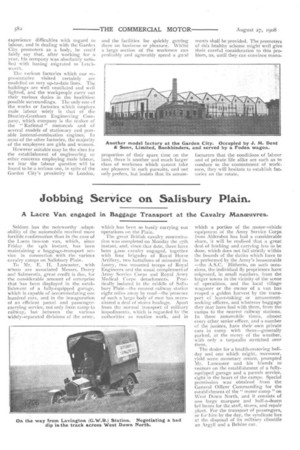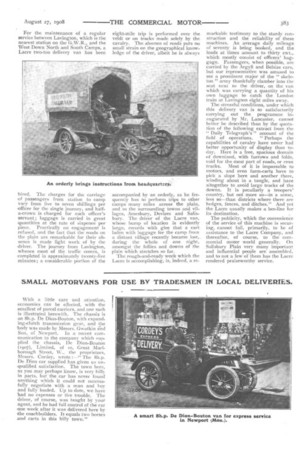Jobbing Service on Salisbury Plain.
Page 4

Page 5

If you've noticed an error in this article please click here to report it so we can fix it.
A ',acre Van, engaged in Baggage Transport at the Cavalry Manceuvres.
Seldom has the noteworthy adaptability of the automobile received more forcible confirmation than in the case of the Lacre two-ton van, which, since Friday the 14th instant, has been maintaining a baggage-transport service in connection with the various cavalry camps on Salisbury Plain.
To Mr. E. II, Lancaster, with whom are associated Messrs. Davey and S.olmerstiz, great credit is due, for the considerable amount of enterprise that has been displayed in the establishment of a fully-equipped garage, which is capable of accommodating one hundred cars, and in the inauguration of an efficient parcel and passengercarrying service, not only from camp to railway, but between the various widely-separated divisions of the army, which has been so busily carrying out operations on the Plain.
The great British cavalry concentration was completed on Monday the terh instant, and, since that date, there have been 5,ono cavalry engaged, together with four brigades of Royal Horse Artillery, two battalions of mounted infantry, two mounted troops of Royal Engineers and the usual complement of Army Service Corps and Royal Army Medical Corps detachments. Practically isolated in the middle of Salisbury Plain—the nearest railway station eight miles away by road—the presence of such a large body of men has necessitated a deal of stores haulage. Apart from the normal transport of military impedimenta, which is regarded by the authorities as routine work, and in which a portion of the motor-vehicle equipment of the Army Service Corps from Aldershot has had a considerable share, it will be realised that a great deal of fetching and carrying has to be done, which does not fall strictly within the bounds of the duties which have to be performed by the Army's housemaids —the A.S.C. Hitherto, on such occasions, the individual fly proprietors have migrated, in small numbers, from the larger towns in the vicinity of the scene of operations, and the local village wagoner or the owner of a van has reaped a golden harvest by the transport of leave-taking or amusementseeking officers, and whatever baggage they may have had with them, from the camps to the nearest railway stations. In these automobile times, almost every other senior officer, and a number of the juniors, have their own private cars in camp with them—generally parked, at the mercy of the weather, with only a tarpaulin stretched over them.
The desire for a health-restoring holiday and one which might, moreover, yield some monetary return, prompted Mr. Lancaster and his friends to venture on the establishment of a fullyequipped garage and a parcels service, right in the heart of the camps. Special permission was obtained from the General Officer Commanding for the establishment of the " motor camp " on West Down North, and it consists of one large marquee and half-a-dozen bel ltents for the staff, stores, and repair plant. For the transport of passengers, or for hire by the day, the syndicate has at the disposal of its military clientele an Argyll and a Belsize car. For the maintenance of a regular service between Lavington, which is the nearest station on the G.W.R., and the West Down North and South Camps, a Lacre two-ton delivery van has been hired. The charges for the carriage of passengers from station to camp vary from five to seven shillings per -officer for the single journey, and halfa-crown is charged for each officer's servant ; luggage is carried in great quantities at the rate of sixpence per piece. Practically no engagement is refused, and the fact that the roads on the plain are remarkable for their absence is made light work of by the driver. The journey from Lavington, whence most of the traffic comes, is completed in approximately twenty-five minutes ; a considerable portion of the
With a little care and attention, economies can be effected, with the smallest of parcel carriers, and one such is illustrated herewith. The chassis is an 8h.p. De Dion-Bouton, with expanding-clutch transmission gear, and the body was made by Messrs. Gwatkin and Son, of Newport. In a recent communication to the company which supplied the chassis, De Dion-Bouton (i9o7), Limited, of io, Great Marlborough Street, W., the proprietors, Messrs. Cordey, wrote :—" The Step. De Dion car supplied has given us Unqualified satisfaction. The town here, as you may perhaps know, is very huh in parts, but the car has never found -anything which it could not successfully negotiate with a man and boy and fully loaded. Up to date, we have had no expenses or tire trouble. The driver, of course, was taught by your agent, and he had full control of the car one week after it was delivered here by the coachbuilders. It equals two horses and carts in this hilly town."
eight-mile trip is performed over the veldt or on tracks made solely by the cavalry. The absence of roads puts no small strain on the geographical knowledge of the driver, albeit he is always accompanied by an orderly, as he frequently has to perform trips to other camps many miles across the plain, and to the surrounding towns and villages, Amesbury, Devizes and Salisbury. The driver of the Lacre van, whose bump of location is evidently large, records with glee that a cart laden with luggage for the camp from a distant village recently became lost,. during the whole of one night, amongst the follies and downs of the plain which stretches so far,
The rough-and-ready work which the Lacre is accomplishing, is, indeed, a re
markable testimony to the sturdy construction and the reliability of these machines. An average daily mileage of seventy is being booked, and the loads at times amount to thirty cwt., which mostly consist of officers' baggage. Passengers, when possible, are carried by the Argyll and Belsize cars, but our representative was amused to see a prominent major of the " skeleton " army thankfully clamber into the seat next to the driver, on the van which was carrying a quantity of his own luggage to catch the London train at Lavington eight miles away. The stressful conditions, under which this delivery van is so satisfactorily carrying out the programme inaugurated by Mr. Lancaster, cannot better be described than by the quotation of the following extract from the " Daily Telegraph's" account of the field of operations. " Perhaps the capabilities of cavalry have never had better opportunity of display than today. Here is a free, spacious domain of downland, with furrows and folds, void for the most part of roads, or even tracks. Most of it is impassable to motors, and even farm-carts have to pick a slope here and another there, winding about in a tangle, and have altogether to avoid large tracks of the downs. It is peculiarly a troopers' country, but not more so—in a sense, less so—than districts where there are hedges, fences, and ditches." And vet the Lacre usually makes a bee-line 'for its destination.
The publicity, which the convenience of the service of this machine is securing, cannot fail, primarily, to be of assistance to the Lacre Company, and thereafter, of course, to the commercial motor world generally. On Salisbury Plain very many important and influential people are assembled, and to not a few of them has the Lacre rendered praiseworthy service.




















